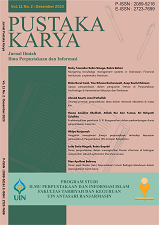Kontekstualisasi pemikiran S. R. Ranganathan dalam perkembangan dunia perpustakaan masa kini
DOI:
https://doi.org/10.18592/pk.v11i2.11308Keywords:
lima hukum ilmu perpustakaan, s.r ranganathan, tokoh perpustakaanAbstract
Science is dynamic so it continues to develop over time. A number of figures contributed to coloring scientific dynamics, one of which was S.R Ranganathan who dedicated his life to the world of libraries. His name is well known as the Father of Libraries in India and his ideas spread throughout the world. His magnum opus Prolegomena to Library Classification and Colon Classification stimulated the birth of the Dewey Decimal Classification. Apart from that, his work as outlined in the Five Laws of Library Science had a major impact on the development of the world of libraries. This research uses a qualitative research method with a type of literature study (library research), then the data that has been obtained will be followed by reading and note-taking techniques and then processed the data analytically and descriptively. This article aims to find out the contextualization of S.R Ranganathan's five laws in the development of today's library world. These five laws read: Books are for use, Every reader his or her book, Every book its reader, Save the time of readers, and The library is a growing organism are still relevant today which is synonymous with technology and digitalization.References
Andrianza, Y., & Prayitno, D. E. (2021). Relevansi Teori Ranganathan dalam Pengembangan Koleksi di Abad 21. Tibanndaru : Jurnal Ilmu Perpustakaan Dan Informasi, 5(1), 96. https://doi.org/10.30742/tb.v5i1.1176
Anggreanie, D. I., & Zulaikha, S. R. (2022). Implementasi Dalil Kelima Hukum Ranganathan terhadap Layanan Perpustakaan di Era Digital. Tadwin: Jurnal Ilmu Perpustakaan Dan Informasi, 3(2), 23–32. http://jurnal.radenfatah.ac.id/index.php/tadwin
Babu, B. R. (2011). Relevance of Five Laws of Library Science in the Contemporary Library World. Journal of the Korean Society for Library and Information Science, 45(4), 253–269. https://doi.org/10.4275/kslis.2011.45.4.253
Barner, K. (2011). The Library is a Growing Organism: Ranganathan’s fifth law of library science and the academic library in the digital era. Library Philosophy and Practice, 9.
Five laws of library science. (n.d.). In Module-1 Library, Information, and Society. National Institute of Open Schooling. https://www.nios.ac.in/media/documents/SrSecLibrary/LCh-004.pdf
Giri, S., Gupta, N., Diksha, & Chakravarty, R. (2021). Visualizing Google Scholar Profile of Dr. S.R. Ranganathan using PoP and VOSviewer: a tribute to Father of Library Science in India. Library Philosophy and Practice, 2021(November), 1–19.
Hidaya, A. S. (2020). Teori S.R. Ranganathan Five Laws of Library Science dalam Pengembangan Koleksi Perpustakaan. Fihris: Jurnal Ilmu Perpustakaan Dan Informasi, 15(1), 18. https://doi.org/10.14421/fhrs.2020.151.18-30
Juniastika, K. A. (2012). Unsur-Unsur Emosi yang Mendasari Perilaku Tokoh Utama Dalam Novel Week-end de chasse à la mère Karya Geneviève Brisac. Students E-Journal, 1(1). https://journal.unpad.ac.id/ejournal/article/view/1723/1739
Kemdikbud. (2022). KBBI Daring. Kbbi.Kemdikbud.Go.Id. https://kbbi.kemdikbud.go.id/
Kent, A. (1978). Professor S.R. Ranganathan: a short biography. In Encyclopedia of Library and Information Science (Vol. 25). Marcel Dekker Inc.
Laksmi. (2022). Metode Penelitian Perpustakaan. Universitas Terbuka
Mafar, F. (2011). Ranganathan VS Gorman: Tinjauan Atas Perkembangan Five Laws of Library Sciences. In Jurnal Ilmu Budaya (Vol. 7, Issue 2, pp. 57–117).
Masriastri, I. G. A. K. Y. (2018). Perpustakaan dan Masyarakat Informasi. Al-Maktabah, 3(2).
Meena, P. C. (2015). Relevance of Ranganathan’ s Five Laws of Library Science in Present ICT Rea. AIJRA, III(Ii), 1–5. http://www.ijcms2015.co/file/2018-vol-III-issue-ii-april2018/aijra-vol-iii-issue-2-16.pdf
Miles, M. B., & Huberman, A. M. (2014). Analisis Data Kualitatif: Buku Sumber Tentang Metode-metode Baru. UI Press.
Rahardi, R. K. (2021). Pragmatik: Lanskap Konteks Sosial, Sosietal, Situasional, dan Kultural dalam Studi Maksud Penutur. Amara Books.
Rohana, R., & Adryawin, I. (2019). Five Laws of Library Science: Sebuah Pemikiran Yang Dinamis Dari Ranganathan. Jurnal Ilmu Perpustakaan (Jiper), 1(1), 1–7. https://doi.org/10.31764/jiper.v1i1.1498
Safii, M. (2019). Redefining The Five Laws of Library Science in the Digital Age. Advances in Social Science, Education and Humanities Research, 302(ICCLAS 2018), 24–27. https://doi.org/10.2991/icclas-18.2019.7
Sugiyono. (2019). Metode Penelitian Kuantitatif, Kualitatif, dan R&D. Alfabeta.
The Editors of Encyclopedia Britannica. (n.d.). S.R. Ranganathan. Britannica.Com. https://www.britannica.com/biography/S-R-Ranganathan
Widiyastuti. (2016). Pemikiran Jesse H Shera dan Perkembangan Pendidikan Ilmu Perpustakaan di Indonesia. Jurnal Pustaka Budaya, 3(1). https://journal.unilak.ac.id/index.php/pb/article/view/573
Wijana, I. D. P., & Rohmadi, M. (2011). Analisis Wacana Pragmatik: Kajian Teori dan Analisis. Yuma Pustaka.
Yule, G. (1996). Pragmatics. OUP Oxford
Zulaikha, S. R. (2008). Kontribusi S.R. Ranganathan dalam Perkembangan Ilmu Perpustakaan Dewasa Ini. Jurnal Ilmu Perpustakaan Dan Informasi, III(1), 5–6. http://digilib.uin-suka.ac.id/259/1/KONTRIBUSI S.R. RANGANATHAN DALAM PERKEMBANGAN.pdf
Downloads
Published
How to Cite
Issue
Section
License
Copyright (c) 2023 Husna Amalina Sholihah, Atikah Nur Aini Yumna, Sri Rohyanti Zulaikha

This work is licensed under a Creative Commons Attribution 4.0 International License.
Copyright (c) Author (s)

Pustaka Karya: Jurnal Ilmiah Ilmu Perpustakaan dan Informasi is licensed under a Creative Commons Attribution 4.0 International License.
- Articles published in Pustaka Karya are licensed under a Creative Commons Attribution 4.0 International License. You are free to copy, transform, or redistribute articles for any lawful purpose in any medium, provided you give appropriate credit to the original author(s) and Pustaka Karya.
- Copyright on articles is retained by the respective author(s), without restrictions. A non-exclusive license is granted to Pustaka Karya to publish the article and identify itself as its original publisher, along with the commercial right to include the article in a hardcopy issue for sale to libraries and individuals.
- By publishing in Pustaka Karya, authors grant any third party the right to use their article to the extent provided by the Creative Commons Attribution 4.0 International license.









1.png)
1.png)

